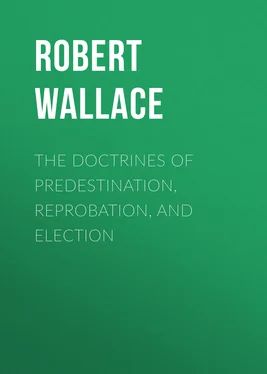Robert Wallace - The Doctrines of Predestination, Reprobation, and Election
Здесь есть возможность читать онлайн «Robert Wallace - The Doctrines of Predestination, Reprobation, and Election» — ознакомительный отрывок электронной книги совершенно бесплатно, а после прочтения отрывка купить полную версию. В некоторых случаях можно слушать аудио, скачать через торрент в формате fb2 и присутствует краткое содержание. Жанр: foreign_prose, foreign_religion, Философия, foreign_psychology, foreign_antique, на английском языке. Описание произведения, (предисловие) а так же отзывы посетителей доступны на портале библиотеки ЛибКат.
- Название:The Doctrines of Predestination, Reprobation, and Election
- Автор:
- Жанр:
- Год:неизвестен
- ISBN:нет данных
- Рейтинг книги:4 / 5. Голосов: 1
-
Избранное:Добавить в избранное
- Отзывы:
-
Ваша оценка:
- 80
- 1
- 2
- 3
- 4
- 5
The Doctrines of Predestination, Reprobation, and Election: краткое содержание, описание и аннотация
Предлагаем к чтению аннотацию, описание, краткое содержание или предисловие (зависит от того, что написал сам автор книги «The Doctrines of Predestination, Reprobation, and Election»). Если вы не нашли необходимую информацию о книге — напишите в комментариях, мы постараемся отыскать её.
The Doctrines of Predestination, Reprobation, and Election — читать онлайн ознакомительный отрывок
Ниже представлен текст книги, разбитый по страницам. Система сохранения места последней прочитанной страницы, позволяет с удобством читать онлайн бесплатно книгу «The Doctrines of Predestination, Reprobation, and Election», без необходимости каждый раз заново искать на чём Вы остановились. Поставьте закладку, и сможете в любой момент перейти на страницу, на которой закончили чтение.
Интервал:
Закладка:
CHAPTER III.
THE DOCTRINE OF PREDESTINATION CONSIDERED WITH REFERENCE TO ALMIGHTY POWER
The Power of God is held as supporting universal foreordination. As in the case of wisdom, God’s power must be recognised as infinite. It is true, indeed, that creation does not prove this, since it is limited, and no conclusion can be more extensive than the premises. But looking at the nature and multitude of His works, we cannot resist the conviction that there is nothing (which does not imply a contradiction) that is “too hard for the Lord.” He is infinite in power. But the power of God is guided by His wisdom and His love, just as is the power of a good and a wise king. In governing His creation, it stands to reason that He will govern each creature according to its nature—brute matter by physical law, animals by instinct, and man in harmony with his rational constitution. God does not reason with a stone, or plead with a brute; but He does so with man. “Come, now, and let us reason together, saith the Lord” (Isa. i. 18). It would be absurd to punish a block of granite because it was not marble, or to condemn the horse because he could not understand a problem in Euclid. To do so would be to treat the creatures by a law not germane to their nature. It is, indeed, a radical vice in Calvinistic reasoning that, because God is omnipotent, He can as easily therefore create virtue in a free being as He can waft the down of the thistle on the breeze. It is quite true that “whatsoever the Lord pleased that did He in heaven and in earth” (Ps. cxxxv. 6). But the question is—What is His pleasure in regard to the production of virtue? Is it a forced or free thing? Every good man will cheerfully ascribe to God the praise of his (the good, man’s) virtue. God gave him his constitution; God’s Spirit brought to bear on him the motives of a holy life. Had there been no Spirit, there would have been no holy life. Yet there is a sense in which the personal righteousness of the good man is his own righteousness. It consists in right acts, in right acts as regards God and as regards man. God told him what to do, and when he did it the acts became his acts, and were not the acts of God, nor of any other. When he does the thing that was right, he is commended—when he does not, he is blamed. Conversing one day with a Calvinistic clergyman, he intimated that a certain person had declared that the only thing stronger than God in the world was the human will. We remarked that we did not approve of such a mode of expression. And rightly so. It implies a confusion of ideas, confounding physical power which is almighty, and moral power, which is suasory and resistible. Stephen charged the Jews with resisting the Spirit. “Ye stiff-necked and uncircumcised in heart and ears, ye do always resist the Holy Ghost: as your fathers did, so do ye” (Acts vii. 51). Because they resisted him, would it be right to say that they were physically stronger than God? We replied to the clergyman that we supposed that the person who used the expression meant that God did not get people to do what He wished. The reply was that we were equally wrong. We then asked, “Do you think that God wishes people to keep His law?” He refused to answer the question. But why would he not? Aye, why? He was in this dilemma: If he said that He did wish them to keep His law, he would have been met by the question, Why then does He not make them do so? Everywhere the law is broken. If he said that God did not wish them to keep His law, would not this have been to put the Holy One on a level with the great enemy of man? This brings out the idea that whilst God is possessed of infinite power, in the exercise of that power He has respect to the constitution of man in the production of virtue. He does not override the constitution, and treat it as if it were a nullity. To do so would be absurd, for forced virtue is not virtue at all. God is all-powerful, but He is also all-wise.
CHAPTER IV.
PREDESTINATION CONSIDERED WITH REFERENCE TO DIVINE FOREKNOWLEDGE
The Foreknowledge of God is held as evidence that He has foreordained whatsoever comes to pass. He foreknows, so it is argued, but He does so because He has foreordained. Calvin says, “Since He (God) doth not otherwise foresee the things that shall come to pass than because He hath decreed that they should so come to pass, it is vain to move a controversy about foreknowledge, when it is certain that all things do happen rather by ordinance and commandment” (B. iii.) Toplady says “that God foreknows futurities, because by His predestination He hath rendered their futurition certain and inevitable.” Bonar says, “God foreknows everything that takes place, because he Has fixed it” ( Truth and Error , p. 50). The same doctrine is held by the younger Hodge—that foreknowledge involves foreordination.
There have been some who have denied the infinitude of God’s knowledge, notably Dr. Adam Clarke. He held that God, although possessed of omnipotence, yet as He chooses not to do all things, so also although He possesses the power of knowing all things, yet He chooses to be ignorant of some things. In refuting this notion, Dr. Hodge remarks, “But this is to suppose that God wills not to be God, that the Infinite wills to be finite. Knowledge in God is not founded on His will, except so far as the knowledge of vision is concerned— i.e. , His knowledge of His own purposes, or what He has decreed shall come to pass. If not founded on His will it cannot be limited by it. Infinite knowledge must know all things actual or possible” (Vol. I., p. 546). Although the motive underlying Clarke’s argument is good, yet it is not wise to sacrifice the Divine intelligence to the Divine goodness. God is the infinitely perfect one, but to suppose that He is ignorant of what will happen tomorrow is to limit His perfections, and make Him a dependent being. But neither can we accept the Calvinistic doctrine, that God foreknows because He has foreordained. This, properly speaking, is not foreknowledge, but after knowledge, since it comes after the decree. It is, moreover, simply assertion. It is not a self-evident proposition, and is neither backed by reason nor Scripture. The great difficulty, however, with our Calvinistic friends is regarding certainty. If God is certain that an event will happen, then, so it is argued, it must happen. If we deny that there is an absolute necessity for the event as an event happening, then it is replied that God in that case was not certain. But this is sophistical reasoning—slipshod philosophy. God was certain that the event would happen, but He was also certain that it need not have happened. The Divine knowledge is simply a state of the Divine intelligence, and never causes any thing. It comprehends all that is past, all that now is, and all that will ever be. But it comprises more than this, and herein lies the key of the mystery. It takes in the possible, or that which is never realised in the actual. Human knowledge does this—and how much more the Divine! God knows that the thief will steal; He is certain that he will do it, but He is also certain that he need not do it. His being certain that the theft will take place does not necessitate the theft. It (the certainty) exercises no controlling agency upon the wrong-doer. Dr. W. Cooke remarks, “What is involved in necessity? It is a resistless impulse exerted for a given end. What is freedom? It involves a self-determining power to will and to act. What is prescience? It is simply knowledge of an event before it happens. Such being, we conceive, a correct representation of the terms, we have to inquire, where lies the alleged incompatibility of prescience and freedom? Between freedom and necessity there is, we admit, an absolute and irreconcilable discrepancy and opposition; for the assertion of the one is a direct negation of the other. What is free cannot be necessitated, and what is necessitated cannot be free. But prescience
Читать дальшеИнтервал:
Закладка:
Похожие книги на «The Doctrines of Predestination, Reprobation, and Election»
Представляем Вашему вниманию похожие книги на «The Doctrines of Predestination, Reprobation, and Election» списком для выбора. Мы отобрали схожую по названию и смыслу литературу в надежде предоставить читателям больше вариантов отыскать новые, интересные, ещё непрочитанные произведения.
Обсуждение, отзывы о книге «The Doctrines of Predestination, Reprobation, and Election» и просто собственные мнения читателей. Оставьте ваши комментарии, напишите, что Вы думаете о произведении, его смысле или главных героях. Укажите что конкретно понравилось, а что нет, и почему Вы так считаете.












